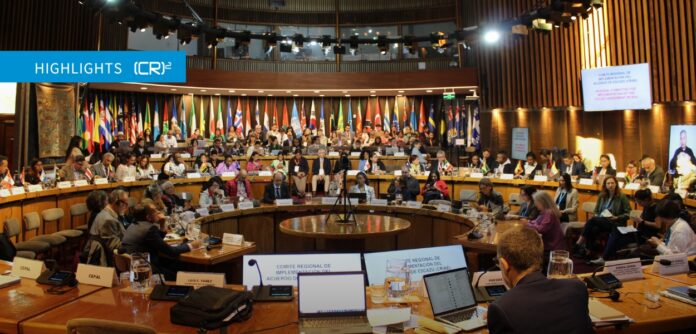By: CR2 Communications
- Pilar Moraga, an academic from the Faculty of Law at the University of Chile and director of the Center for Climate Science and Resilience CR2 participated in one of the parallel events of this global conference, where they presented the progress of Chile’s Framework Law on Climate Change. Protecting environmental defenders is one of the main advancements achieved in this meeting to implement the Escazú Agreement. A significant part of the commitments will now depend on the work of each of the States Parties and the application of the treaty’s articles in their national regulations.
The Regional Agreement on Access to Information, Public Participation and Justice in Environmental Matters in Latin America and the Caribbean, also known as the Escazú Agreement, is a multilateral treaty open to 33 countries in Latin America and the Caribbean. It stems from Principle 10 of the Rio Declaration on Environment and Development at the Earth Summit, held in 1992, and aims to ensure greater civil society participation in environmental issues.
Since that date, there has been a long journey until its entry into force in 2021, after the ratification of eleven countries, as indicated in Article 22 of the Agreement. Currently, 24 signatory States and another 16 have ratified their participation (the so-called States Parties). The latest to join was the Commonwealth of Dominica this past Tuesday.
Within the Agreement, periodic meetings of all States Parties are held to implement the different articles considered in the treaty. In this context, the third Conference of the Parties to the Escazú Agreement (COP3) concluded last Wednesday, April 24, at the Economic Commission for Latin America and the Caribbean (ECLAC) headquarters in Santiago, Chile.
Among the main highlights of this meeting is the approval of the Regional Action Plan on Human Rights Defenders in Environmental Matters, which is based on Article 9 of the Agreement, which states that “each Party shall take appropriate, effective and timely measures to prevent, investigate and punish attacks, threats or intimidation that human rights defenders in environmental matters may suffer in the exercise of the rights contemplated in this Agreement.” This advancement is of particular importance for Latin America, as the report by Global Witness established that 88% of murders of land defenders in 2022 occurred in this region.
For Pilar Moraga, an academic at the Faculty of Law of the University of Chile and director of the Center for Climate Science and Resilience CR2, the approval of this plan is a crucial milestone. “It is a tremendous advance since this allows environmental defenders or activists to carry out their work in safer terms, especially in countries like those in Latin America, where there is a permanent tension with the exploitation of natural resources and, therefore, tension between what is economic development and respect for communities, their ways of life and their environment,” said the director of the Center for Environmental Law at Casa de Bello.
Another notable event was the launch of the Committee to Support the Implementation and Compliance of the Escazú Agreement, a non-punitive and non-sanctioning body composed of seven civil society representatives responsible for supporting the Agreement’s implementation for the States Parties and providing recommendations for its operationalization.
The progress of this committee was one of the central points of debate at the meeting, as the Bolivian delegation argued that in the format it was proposed, “the committee would prevent the effective participation of indigenous peoples in decision-making mechanisms,” according to Diego Pacheco, head of the Bolivian delegation. For this reason, Bolivia presented a proposal for the committee to be divided into two subsidiary bodies with representation from the States Parties. Ultimately, this proposal was not voted on but included in the minutes.
Parallel Events and Projections
For the re-elected president of the COP bureau, Marcelo Cousillas, the approval of the Regional Plan for Environmental Defenders makes the Agreement “the first international instrument that includes a specific article aimed at ensuring that States Parties protect environmental defenders.” He also emphasized the importance of the regulations that the Parties must develop since the implementation of the Agreement “is done through the national plan carried out by each State.”
Chile’s national implementation plan was presented during this COP and considers 56 general actions and 236 specific measures. Professor Pilar Moraga stated that “the Escazú Agreement contributes to raising standards on access to information and citizen participation at the regional level. In that sense, I believe that this obligation is primarily that of the States. It is the State that must create adequate spaces to strengthen access rights in environmental matters and, therefore, democracy.”
The academic from the University of Chile participated in one of the parallel events held within the framework of this meeting, organized by the Center for Environmental Law at the University of Chile. The activity, entitled “Facilitating Access to Environmental Information for Civil Society: Experiences from the Framework Law on Climate Change,” reported on the framework law’s current progress in Chile and its main shortcomings to date.
The director of CR2 also emphasized the need for civil society involvement. “It is not enough for formal participation mechanisms to exist; rather, this participation must be effective, and, in that sense, the Framework Law on Climate Change and its implementation demonstrate how the efforts of the legislator are often not sufficient,” she said.
Finally, it was confirmed that COP4 will be held again between April 22 and 24, 2026, at the ECLAC headquarters in Santiago, Chile. By that meeting, the Committee to Support the Implementation and Compliance is expected to be fully operational. At this next instance, the progress of the approved Plan will be analyzed, and the progress of each Party in applying the Agreement will also be examined.





